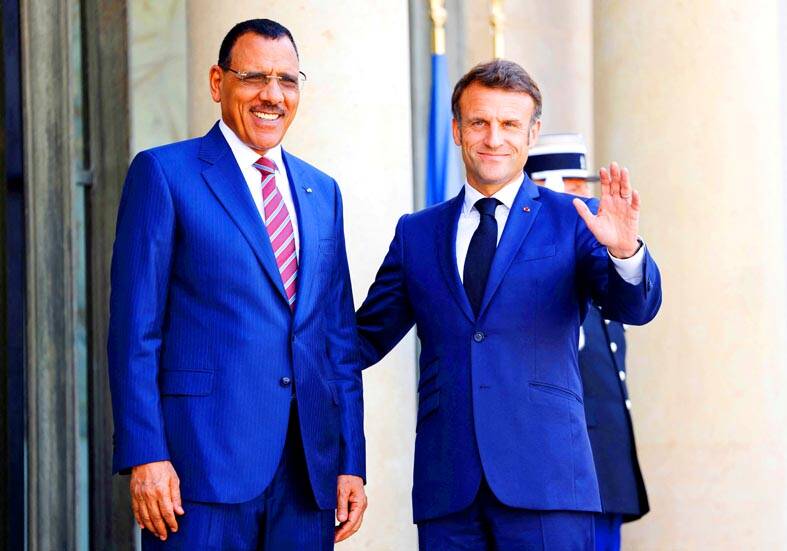Taiwan yesterday hailed France’s pledge to safeguard freedom of navigation in the Taiwan Strait a day after French President Emmanuel Macron signed into law the nation’s largest defense budget increase in more than 50 years.
The French Parliament on July 12 and 13 passed a 413 billion euros (US$453 billion) defense budget for the next seven years, which would push France’s military spending to more than 2 percent of GDP by 2025.
The budget bill — which was spurred by Russia’s invasion of Ukraine and China’s aggressive stance in Asia — said that France is an Indo-Pacific power, and has an obligation to defend freedom of navigation in the Taiwan Strait and the South China Sea.

Photo: AFP
As the only EU member with territories in the Indo-Pacific, France has a duty to uphold the rights of all nations to freely use the seas in the region, French Senator Olivier Cadic, one of the bill sponsors, said during deliberations.
Beijing’s provocative actions — including its efforts to seize international seas as its own, its harassment of legal fishing operations, construction of military bases and incursions into other nations’ sovereign waters — are to blame for the surge in regional tensions in the past few years, Cadic said.
China not only turned a deaf ear to the rulings of international courts with regard to its claims in the South China Sea, but also claims the Taiwan Strait, which poses a direct threat to global trade and maritime transportation, he said.
Beijing’s predatory acts and ever-growing military power means that a move by China to invade Taiwan would trigger a significant crisis, comparable to the Russa-Ukraine war, Cadic said, urging France to contribute to protecting freedom of navigation at sea.
In Taipei, the Ministry of Foreign Affairs said that Paris has significant influence over the Indo-Pacific region, and reiterated the importance of preserving peace and stability in the Taiwan Strait at this year’s G7 summit and other multilateral international events.
The French government’s defense budget indicates a recognition that protecting peace in the Taiwan Strait is aligned with its strategic national interests, and is essential to a free, open and prosperous Indo-Pacific region, the ministry said.
Taiwan would continue to work with France and other like-minded countries to defend the rules-based international order, it said.
Separately, Democratic Progressive Party (DPP) Legislator Wang Ting-yu (王定宇) said the defense budget’s reference to security in the Strait was a first in French law and was a declaration of intent.
The alliance of democracies has reached a consensus that it should maintain peace and stability in the Taiwan Strait, as regional unrest would have global repercussions to the shared interests of its members, Wang said.
DPP Legislator Tsai Shih-ying (蔡適應) thanked the French parliament for passing the bill, adding that a military crisis between Taiwan and China would have unbearable consequences for the world.

MAKING WAVES: China’s maritime militia could become a nontraditional threat in war, clogging up shipping lanes to prevent US or Japanese intervention, a report said About 1,900 Chinese ships flying flags of convenience and fishing vessels that participated in China’s military exercises around Taiwan last month and in January have been listed for monitoring, Coast Guard Administration (CGA) Deputy Director-General Hsieh Ching-chin (謝慶欽) said yesterday. Following amendments to the Commercial Port Act (商港法) and the Law of Ships (船舶法) last month, the CGA can designate possible berthing areas or deny ports of call for vessels suspected of loitering around areas where undersea cables can be accessed, Oceans Affairs Council Minister Kuan Bi-ling (管碧玲) said. The list of suspected ships, originally 300, had risen to about 1,900 as

DAREDEVIL: Honnold said it had always been a dream of his to climb Taipei 101, while a Netflix producer said the skyscraper was ‘a real icon of this country’ US climber Alex Honnold yesterday took on Taiwan’s tallest building, becoming the first person to scale Taipei 101 without a rope, harness or safety net. Hundreds of spectators gathered at the base of the 101-story skyscraper to watch Honnold, 40, embark on his daredevil feat, which was also broadcast live on Netflix. Dressed in a red T-shirt and yellow custom-made climbing shoes, Honnold swiftly moved up the southeast face of the glass and steel building. At one point, he stepped onto a platform midway up to wave down at fans and onlookers who were taking photos. People watching from inside

Japan’s strategic alliance with the US would collapse if Tokyo were to turn away from a conflict in Taiwan, Japanese Prime Minister Sanae Takaichi said yesterday, but distanced herself from previous comments that suggested a possible military response in such an event. Takaichi expressed her latest views on a nationally broadcast TV program late on Monday, where an opposition party leader criticized her for igniting tensions with China with the earlier remarks. Ties between Japan and China have sunk to the worst level in years after Takaichi said in November that a hypothetical Chinese attack on Taiwan could bring about a Japanese

The WHO ignored early COVID-19 warnings from Taiwan, US Deputy Secretary of Health and Human Services Jim O’Neill said on Friday, as part of justification for Washington withdrawing from the global health body. US Secretary of State Marco Rubio on Thursday said that the US was pulling out of the UN agency, as it failed to fulfill its responsibilities during the COVID-19 pandemic. The WHO “ignored early COVID warnings from Taiwan in 2019 by pretending Taiwan did not exist, O’Neill wrote on X on Friday, Taiwan time. “It ignored rigorous science and promoted lockdowns.” The US will “continue international coordination on infectious